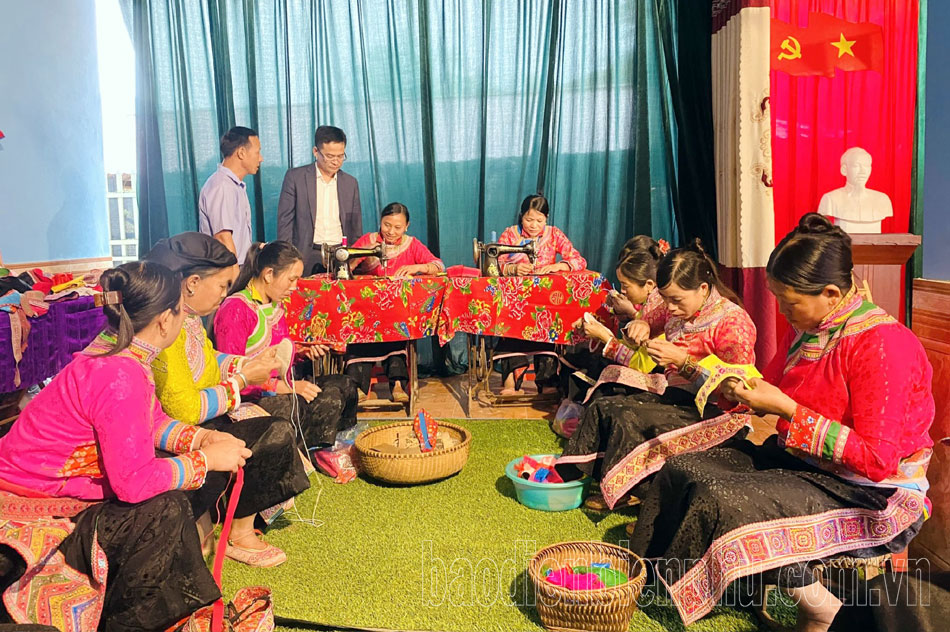The handicraft is a tradition of the Xạ Phang ethnic minority people who live in different areas in Điện Biên, but are concentrated mainly in the Phìn Hồ Commune in Nậm Pồ District, where the practice of embroidering and making colourful shoes is carried out by many families.

Women of the Đệ Tinh 2 Village are dedicating to preserving their traditional craft of shoe embroidery which is named in the National Intangible Cultural Heritage List by the Ministry of Culture, Sports and Tourism.
There are different kinds of shoes, for men and women, for older customer and special ones for the bride and grooms at their weddings. All are sawn and embroidered by the women during their leisure time or holidays, after they are free from working on their farms.
The Xạ Phang still keep the tradition of making their own shoes and wear the most beautiful ones at festivals, when they go to the market or during traditional ceremonies.
Ngải Mù Dính is one of the most experienced in the craft of shoe embroidery. She lives in Phìn Hồ Commune's Đệ Tinh 2 Village, where nearly half of all those living in the 69 homes there, practise traditional embroidery.
It is not her main job and she does not make a living from it, but she devotes her love and passions into the embroidery.
"When we were little girls, our grandmothers, mothers and sisters taught us technique of sewing, embroidery and making household items and personal costumes," said Dính.
"To make a good pair of embroidered shoes, we must go through many steps: preparing materials, choosing a shoe style that is suitable for users, cutting and sewing shoe soles, creating patterns and embroidering these patterns on the shoe and stitching all parts together to have a complete pair of shoes."
Dính said the main materials to make a pair of shoes include fabric, a dried bamboo leaf sheath, threads, glue, paper and other tools such as scissors, small knife, needles and dry beeswax.
The fabric used to sew shoe soles and shoe body must be thick, tough and durable (usually using hand-woven fabric made by the Thái ethnic people).
The sewing thread is made from bark of flax trees which is firm, flexible, tough and less absorbent. From the cut tree trunk, the Xạ Phang women peel off the core to take the bark. They pound it until it is crushed and soft, then boil and dry it. The thin fibres are torn into small pieces, joined together and braided into small threads that are wrapped onto the yarn shuttles.
To keep the threads smooth, shiny, unbroken and waterproof, Xạ Phang women often rub the threads into dry beeswax.
The glue used in the shoe making process is made from the tuber of mùa rỉ, a local forest tree. The tubers are dug up, washed and peeled before they are pounded, mixed with water and filtered out the residue. The wet batter is then put in a pot to cook to until thick.
To make the shoe soles, bamboo leaf sheaths are dried, pressed flat and cut to the shape of a foot. Each shoe sole is usually assembled with about five layers of leaf sheath. Each layer is then covered with fabric to create thickness, stiffness and durability.
The outsole is lined with white fabric while the insole is lined with coloured fabric depending on the maker's preference. All are firmly sewn with each other to ensure the shoes are durable and sturdy and can be used for a long time.
For women, the design is closed-toe, elegant and discreet, with a pattern of a large flower that stands out from the surrounding flowers as a highlight.
For men, the shoe is partially open in the front and sides to help users look strong and dynamic and suitable for activities that need strength. There are different embroidered patterns at the heels and insteps.
"I have been taught how to embroider and make complete shoes since I was small," said young girl Ly Sì Tống of Đệ Tinh 2 Village.
"I find our traditional shoes very beautiful. I like them very much and try to embroider well so that in the future I can pass down the techniques to next generations so that our tradition will not be lost."
The craft of shoe embroidery of the Xạ Phang people in Đệ Tinh 2 Village and Thèn Pả and Huổi Lèng village in Mường Chà District was included in the National Intangible Cultural Heritage List by the Ministry of Culture, Sports and Tourism according to Decision No. 829/QD-BVHTTDL dated March 9, 2021.
In March, the craft of shoe and ethnic costume embroidery of the Xạ Phang people in Đệ Tinh 2 Village was recognised by the Điện Biên People's Committee and granted a certificate of traditional craft recognition according to Decision No. 1898/QD-UBND dated November 23, 2023.
"The recognition will help to promote the development of shoe and ethnic costume embroidery of the Xạ Phang," said Quàng Văn Thảnh, deputy head of the Agriculture and Rural Development Department of Nậm Pồ District
"Having it as a trade brand, the people could build and develop their craft, creating more jobs and increasing incomes for families."





.jpg)
.jpg)
.jpg)
.jpg)

.jpg)
.jpg)
.jpg)
.jpg)
.jpg)

.jpg)
.jpg)


.jpg)
You have 500/500 characters left
Please enter 5 or more characters!!!